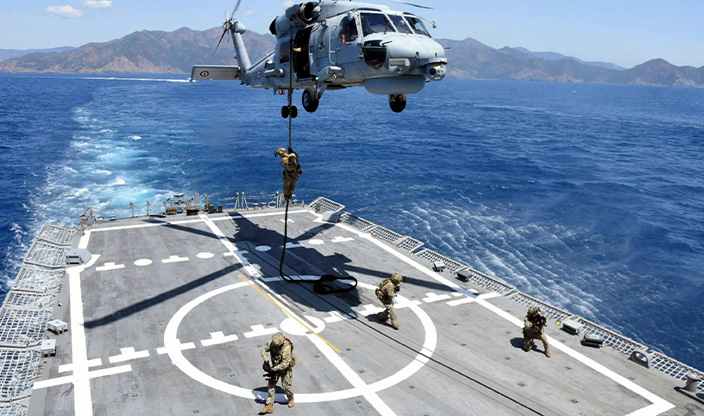Levent Kenez/Stockholm
The Mavi Vatan (Blue Homeland) 2022 naval exercise, which was held simultaneously in the Aegean and Black seas and the eastern Mediterranean with the participation of 122 ships and 41 aircraft, started on April 11 and ended on Thursday. Although the exercise covers three seas, it still highlights Turkey’s continuous targeting of Greek islands as it did the previous year. The fact that the imaginary enemy in the war games is Greece also confirms this.
Turkish Defense Minister Hulusi Akar attended the exclusive observer day activities and addressed a group of officers, including foreign military attachés. President Recep Tayyip Erdoğan congratulated the participants via video link.
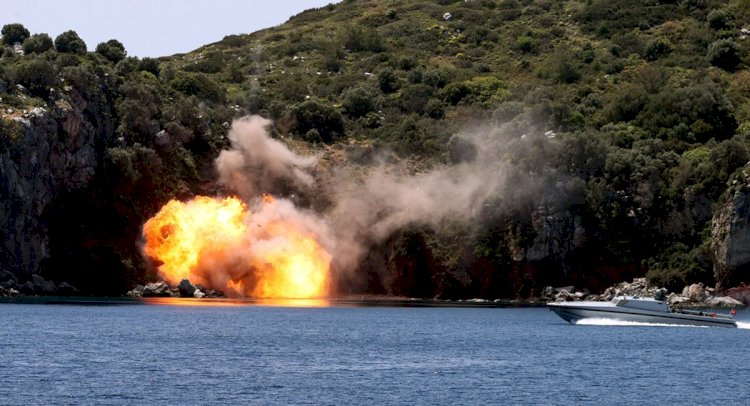
The exercise, named after Mavi Vatan, an aggressive naval doctrine identified with Turkey’s policy in the Mediterranean, included a scenario in which Turkish commandos captured an island and planted a Turkish flag.
According to the plan, underwater offense teams (SAT) started to attack targets on Yılancık Island, near Muğla. While one team dropped into the water from a helicopter, another team approached the island underwater. The teams were accompanied by another team that parachuted down to the island from a helicopter. After the teams destroyed the enemy targets, the Turkish flag was raised on the “captured” island.
Despite the fact that the exercise was conducted with Greece in mind, the Ministry of Defense in a message it posted on Twitter advised that Defense Minister Akar extended a hand of peace to Greece and that this friendly hand, which was sincerely extended, should be taken.
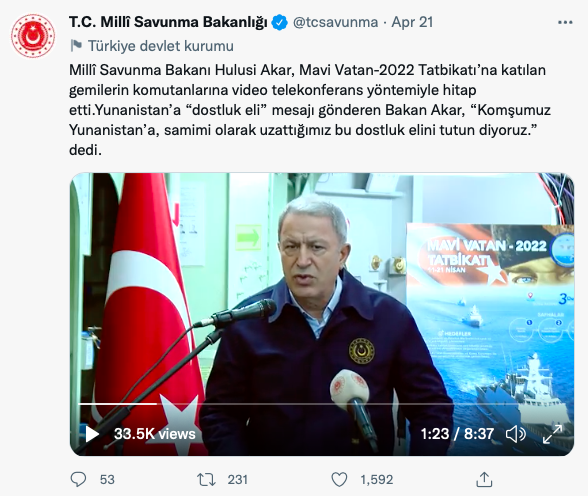
In his speech to the observer delegation, which he reserved entirely for Greece, Akar said the current problems with Greece should be resolved within the framework of good neighborly relations in accordance with international law.
Accusing Greece of being slow to engage in dialogue, Akar said they expect the neighboring country to be more active. Stating that consultation meetings of military delegations from Greece and Turkey should continue, the minister said they would like to see the Greek delegation in Ankara soon.
Greece’s arms race with Turkey has further damaged its poor economy, Akar said, adding that the Greek people suffered the most from this.
Saying that they cannot ignore some actual situations, Akar stated that the most valid and important agreement between Turkey and Greece is the Lausanne Treaty, which states that 23 specifically described islands must never be armed. However, he said Greece has carried out a military buildup on 16 of those islands, adding, “If we are to comply with international law, we must start here.”
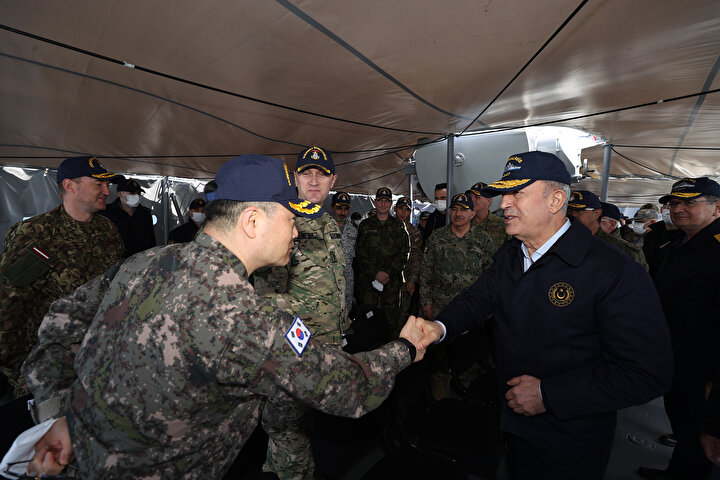
Nordic Monitor previously reported that in a July 13, 2021 letter to the UN Security Council, Feridun Sinirlioğlu, the permanent representative of Turkey to the UN, wrote that “Greece’s continuing deliberate and persistent material breach of the demilitarization provisions of the Lausanne and Paris peace treaties, which are essential to the accomplishment of their object and purpose, constitutes a serious threat to the security of Turkey.”
“Greece is in breach of basic provisions of the treaties under which it acquired sovereignty over the islands, which, from a legal point of view, means that Greece cannot, vis-à-vis Turkey, rely on its title under the same treaties for the purposes of a maritime boundary delimitation,” he added.
In January Turkish naval academy students were seen swimming the distance between Turkey and the Greek island of Kastellorizo (Meis in Turkish) in a video published on the official Twitter account of Turkey’s Defense Ministry. Akar had recently stated that the cadets would swim to Kastellorizio, explaining it as being very close to Turkey in discussions about the island.
The video starts with Akar stating that the cadets would swim to the island, then continues with the presentation of a commander at a swimming pool saying, “We will perform the open sea phase of our swimming training today.” It resembles a fictional production with different shooting angles and post-editing. Drone footage was used to make it more effective.
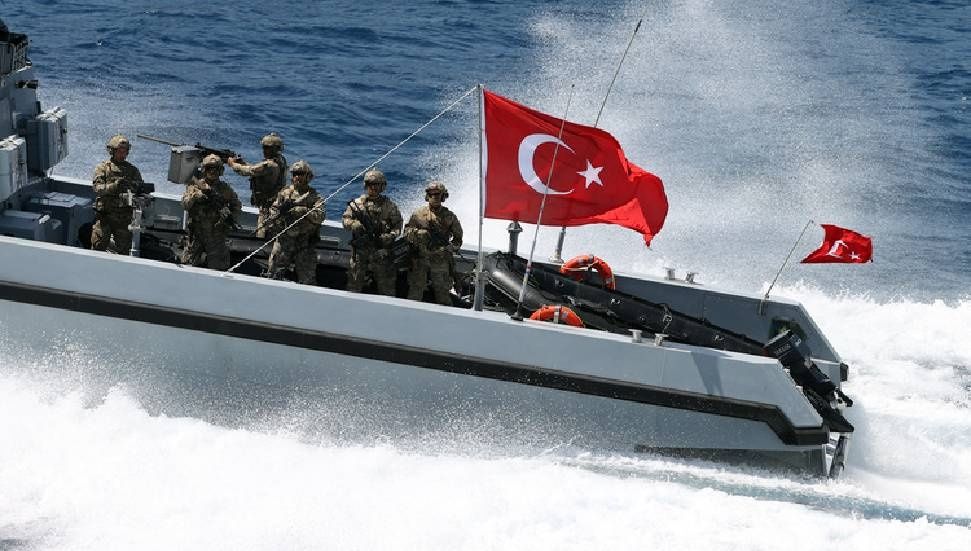
Finally, Turkish weapons manufacturer and defense contractor Roketsan, a subsidiary of the Turkish Armed Forces Foundation, introduced its new missile last week with a simulation video targeting Greece. Military experts speaking to Nordic Monitor state that large arms-producing companies similar to Roketsan have made more global promotions for their international customers but that Turkish companies have been producing simulations targeting Greece and other neighbors for years.
Experts who analyzed the images for Nordic Monitor said the location from where the missiles are fired in the video is the coast of Çeşme in the west of Turkey and that the satellite map in the video has been reproduced with minor changes. They also state that the real islet and rocky images visually featured in the video confirm that they are the shores of Çeşme. In this case, the place shown as the enemy in the video is the Greek island of Chios, which is 4.1 miles from the Turkish coast.
Nordic Monitor previously reported that the Turkish military listed 131 islands, islets and rock formations in the Aegean Sea whose status was disputed with neighboring Greece and prepared plans to take them over during a conflict, according to a confidential document obtained by Nordic Monitor.
The secret document, a PowerPoint presentation with 16 slides, included a map with the disputed locations marked. The presentation appears to have been prepared by the War Academies and lacks a date stamp.
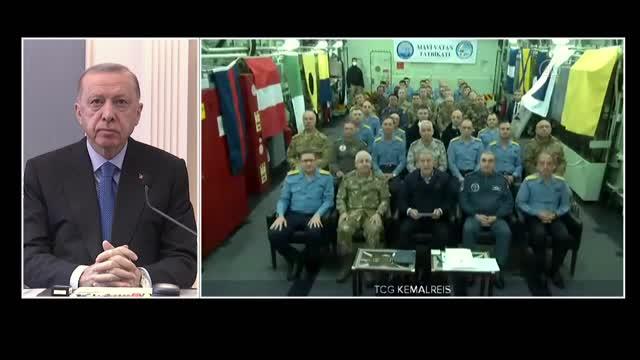
Meanwhile, addressing Turkish commanders and foreign guests via video link on Thursday, Erdoğan stated that having a strong naval force is not a choice but a necessity for Turkey, a country surrounded by seas on three sides.

